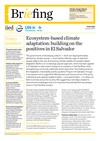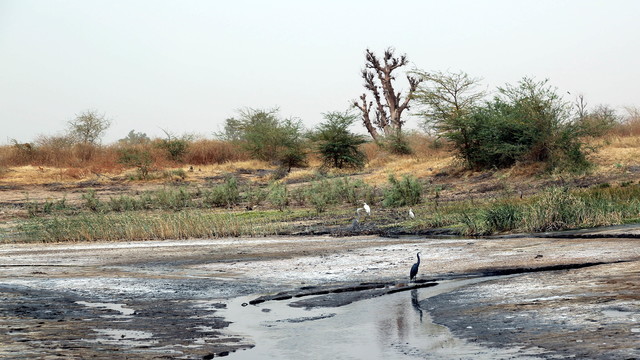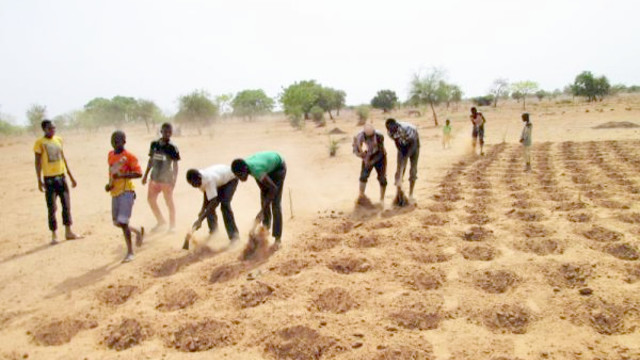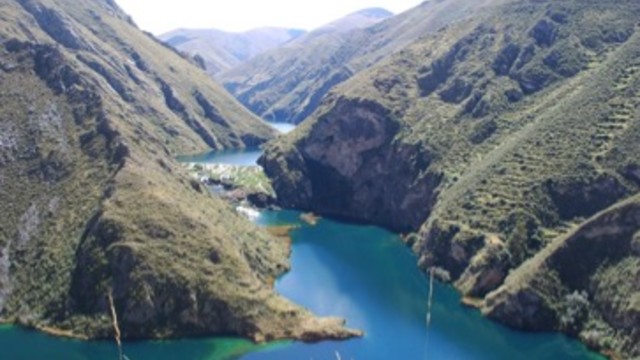EbA Evidence and Policy: El Salvador
IIED and IUCN are using evidence from a project in the Paz River basin in El Salvador, to support the Ministry of Environment and Natural Resources to adopt effective ecosystem-based adaptation as part of its approach to dealing with climate change
Xiaoting Hou Jones was a senior researcher in the biodiversity team of IIED's Natural Resources research group until March 2024

Reforesting mangroves in the Paz River basin. Local people depend directly on the wetlands and mangroves for fishing, wood and firewood (Photo: copyright Orsibal Ramírez/IUCN)
Ecosystem-based adaptation (EbA) involves people using biodiversity and ecosystem services to adapt to the adverse effects of climate change and promote sustainable development. Between 2015 and 2019, IIED, the International Union for the Conservation of Nature (IUCN) and the UN Environment World Conservation Monitoring Centre (UNEP-WCMC) are jointly implementing a project called 'Ecosystem-based approaches to climate change adaptation: strengthening the evidence and informing policy' (EbA Evidence and Policy).
Working with local partners in 12 countries in Asia, Africa and Central and South America, the project aims to gather practical evidence and develop country-specific policy guidance on EbA, and to promote EbA at international level. More information and all the case studies sites are available via the main project page.
What are we doing in El Salvador?
The Governance for Ecosystem-based Adaptation: Transforming Evidence into Change (Go4EbA) project is based in the Ahuachapán department in western El Salvador. Specifically it focuses on the wetland and mangroves of the Aguacate River micro-basin in the lower part of the Paz River basin. About 11,000 people live here - the communities are socially and economically diverse, but over 70% depend directly on the wetlands and mangroves for fishing, wood and firewood.
EbA interventions aim to improve mangrove management and restore water flows, with a view to building adaptive capacity through action learning. Adaptation measures include: clearing river channels to restore water movement and salinity levels, reforestation of critical mangrove areas, community surveillance in order to prevent future over-use, and the design and implementation of a local Plan for Sustainable Extraction (PLES). All these activities are implemented by the local NGO Unidad Ecológica Salvadoreña (UNES).
IUCN El Salvador has used the EbA Evidence and Policy project's framework for assessing EbA effectiveness to consult with communities and national and local government staff. The findings will be combined with those from the 11 other countries to help show climate change policymakers when and why EbA is effective.
Informing policy
Results emerging from the site suggest that there have been widespread improvements in resilience and adaptive capacity and vulnerability has been reduced as a result of project adaptation measures. But also that wider awareness-raising on EbA and further engagement and investment from local and national authorities is needed: the benefits from EbA need to be made more visible to different stakeholders.
IUCN El Salvador is working to support the Ministry of Environment and Natural Resources adopt effective ecosystem-based adaptation as part of its approach to dealing with climate change by including it (or relevant considerations) in the design of policies, governance structures and decision-making processes.
Particular aims are that the government starts to assess monitoring and evaluation efforts in relation to EbA and to integrate M&E systems into EbA activities more widely, as well as taking more actions specifically related to water management which are so crucial for wetland and coastal ecosystems.
Updates from IUCN El Salvador
2018

The IUCN team presented the Framework for defining qualification criteria and quality standards on EbA during a dialogue with the Ministry of Environment´s technical team. The dialogue also informed the Ministry about the preliminary results from the EbA Evidence and Policy project.
2017
- April - The El Salvador team conducted the research study, using the project’s framework, interviewing a range of stakeholders in to understand the effectiveness of EbA. Read more a story about the study (Spanish language page).

- January - The EbA Evidence and Policy project teams from Costa Rica and El Salvador took part in a field trip where they exchanged experiences and prepare for the application of the project's framework for assessing EbA effectiveness in both countries. Read a report about the field trip (Spanish language page).
2016
- IUCN focused on planning of EbA actions in the field and inputting to the baseline study for the EbA Evidence and Policy project's framework. View an infographic about EbA actions in the region (PDF), including El Salvador and Costa Rica (and Panama).
Publications
Additional resources
Ecosystem-based approaches to adaptation: strengthening the evidence and informing policy, Hannah Reid (2015), IIED project flyer | en Español
Comunidades con inteligencia natural, número I, Journal, IUCN (PDF) (Spanish language)
Comunidades con inteligencia natural, número II, Journal, IUCN (PDF) (Spanish language)
Explorando la eficacia de la Adaptación basada en Ecosistemas en el campo, IUCN web page (Spanish language)
IUCN Ave project page (Spanish language)
Unes web page (Spanish language)
Donors
International Climate Initiative (IKI)
The German Federal Ministry for the Environment, Nature Conservation and Nuclear Safety (BMU) supports the IKI on the basis of a decision adopted by the German Bundestag.





